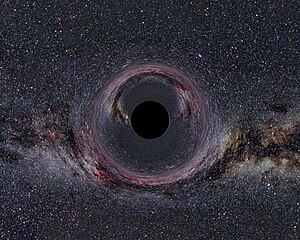 Image via Wikipedia
Image via WikipediaIndeed, Einstein's work on relativity put him at odds with some of the most imminent minds in the history of physics, including Neils Bohr (with whom Einstein waged a series of friendly if highly contest debates on quantum mechanics) and Karl Heisenberg. Often, Einstein proved his critics wrong, rewriting central theses of physics as he went. Still, Einstein was not infallible, and he not infrequently was proven wrong.
Ironically, one of Einstein's most famous missteps was a lifelong refusal to accept the possibility of a certain famous astrophysical phenomenon. Even more ironic, this theoretical basis of this phenomenon is based almost entirely on Einstein's own principles of relativity.
What famous astrophysical phenomenon -- proven possible by relativity -- did Einstein spent his career arguing against?
Einstein argued rather forcefully against the possibility of a Schwarzschild singularity, which we've come to know by the more pronounceable term black hole. Even with such staunch and respected advocates a J. Robert Oppenheimer and Subrahmanyan Chandrasekhar, Einstein never reversed his position that what we now call black holes -- the term was applied to the phenomenon until 1960 -- simply weren't physically possible.
The Schwarzchild singularity basically argued that a certain series of events during a star's collapse could lead to an object of sufficient density that not event light could escape its gravity. Einstein argued that Karl Schwarzschild's idealized version of a black hole simply couldn't occur given the actual complexities of real stars. The star would simply dissipate or explode before becoming Schwarzchild's theoretical singularity. This is especially interesting given that Schwarzschild's singularity theory was the first major application of relativity to be given serious attention by the physics community. The first person to apply Einstein's greatest theory in a creative way never saw his conclusions endorsed by Einstein.
Today, of course, black holes are an accepted component of astrophysical theory, and play an important role in our understanding of the stellar lifecycle and the formation of galaxies. Thus, not even Einstein fully appreciated the various potential implications and application of relativity -- which is why relativity often founds its way into teh ranks of the Truly Trivial.
